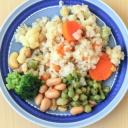
"To gain muscle, calculate your daily calorie intake as: [(Bodyweight in kg / Age) x Average Calorie Consumption] 1000 calories, with 30% water intake, 30% from fats, and 40% for muscle gain."

Are you looking to build muscle and achieve a lean, strong physique? One of the key factors in muscle gain is your calorie intake. To effectively build muscle, you need to consume the right amount of calories to support your workouts and provide your body with the necessary nutrients. But how many calories should you eat per day to gain muscle? Let's dive into the details.
When it comes to building muscle, the concept of calorie intake is twofold. First, you need to consume enough calories to provide your body with the energy it needs to perform intense workouts and recover from them. Second, you should aim to consume a surplus of calories to support muscle growth.

The exact number of calories you should eat depends on various factors such as your age, gender, weight, activity level, and overall goals. However, a general guideline is to consume around 250-500 calories above your maintenance level. This surplus ensures that your body has an adequate energy supply for muscle growth.
To determine your daily caloric needs for muscle gain, you can use the following equation:
Caloric Needs = Basal Metabolic Rate (BMR) Thermic Effect of Food (TEF) Physical Activity Level (PAL) Caloric Surplus

Your BMR represents the number of calories your body needs to maintain basic bodily functions at rest. TEF accounts for the energy required to digest and process the food you consume. PAL reflects the calories burned through physical activity, including exercise and everyday movement.
Let's say you're a 30-year-old male, weighing 180 pounds, with a sedentary job but engaging in moderate exercise. Here's how you can calculate your caloric needs:

When it comes to gaining muscle, it's essential to fuel your workouts properly. Consuming a pre-workout meal or snack rich in carbohydrates and protein can provide the necessary energy and nutrients to optimize your performance. This can include options like a banana with peanut butter or a protein shake with oats.

Additionally, post-workout nutrition plays a crucial role in muscle recovery and growth. Aim to consume a combination of protein and carbohydrates within 1-2 hours after your workout. This can be achieved through a balanced meal or a protein shake with fruit.
While a caloric surplus is generally recommended for muscle gain, it is possible to build muscle in certain circumstances without consuming excess calories. This typically occurs in beginners or individuals with a higher body fat percentage.
No, the source of your calories matters. It's important to focus on consuming nutrient-dense foods that provide essential vitamins, minerals, and macronutrients. Prioritize lean proteins, complex carbohydrates, and healthy fats to support muscle growth and overall health.
Tracking your calorie intake can be beneficial, especially when you're starting your muscle-building journey. It helps you ensure you're consuming enough calories and macronutrients to support your goals. Various apps and websites can assist you in monitoring your daily intake.

Building muscle requires a strategic approach to calorie intake. By consuming a slight surplus of calories and focusing on nutrient-dense foods, you can provide your body with the energy and nutrients it needs to support muscle growth. Remember to tailor your caloric intake to your individual needs and consult with a healthcare professional or registered dietitian for personalized advice.